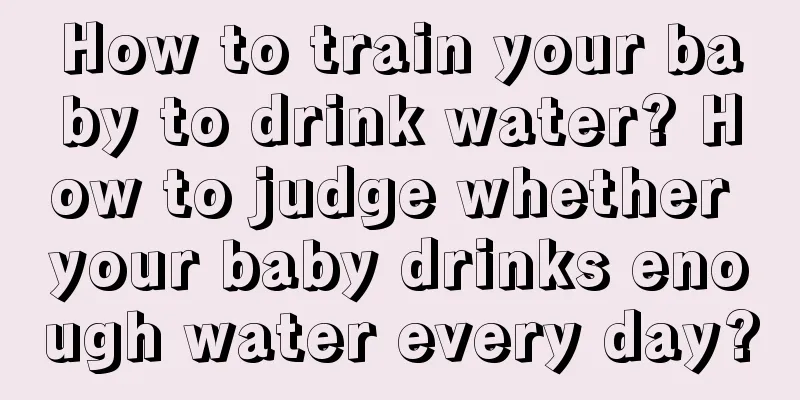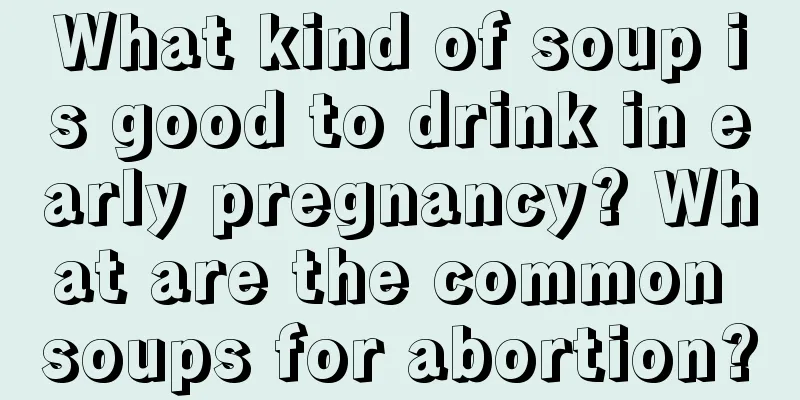How to train your baby to drink water? How to judge whether your baby drinks enough water every day?

|
As babies grow up, the focus of "drinking water" at different stages is different. Especially after they start eating complementary foods, how to feed babies water has become a headache for new parents. How much water should babies drink? And how to help babies learn to drink water by themselves? The following will answer all the questions for parents! Before 1 year old: Don’t drink too much waterFor babies under 6 months old, the water they get from breast milk or formula is basically enough and no additional supplement is needed. If babies aged 6 to 12 months drink milk and excrete normally, you can occasionally give them 20 to 50 ml of water between meals to quench their thirst. If the baby drinks less milk and eats more complementary foods, the proportion of water should be increased accordingly! Is your baby drinking enough water every day?There are no strict restrictions on water intake for babies over 1 year old. As long as the baby maintains a regular diet and daily routine, parents basically do not need to calculate the amount of water they drink. Parents can also simply judge whether they need to replenish water from the following three aspects~ Observe the urine volume: If the baby's urine volume is significantly reduced compared to before, or it seems that he has not urinated much all day, it may be that he is not getting enough water. Physical appearance: for example, sunken fontanelle (the soft, pulsating area on the forehead near the top of the head), sunken eyeballs or cheeks, dry oral mucosa and lips, lack of skin elasticity, and inability to cry with few tears. Dehydration: In addition to changes in physical appearance, if the baby is confused, has cold limbs, is sleepy, has a rapid heartbeat or rapid breathing, this is a sign of dehydration and the baby should be given water or even seek help from a pediatrician. In addition to observing your baby's activity level, urine output, and physical condition to provide water, if you want to plan the amount of water your baby needs for the day, you can refer to the table below. 3.5-10 kg: 100 ml x kg Example: 8 kg baby: 100 x 8 = 800 ml 11-20 kg: 50 ml x (kg - 10) + 1000 ml Example: 15 kg baby: 50 x (15-10) + 1000 ml = 1250 ml More than 20 kg: 20 ml x (kg - 20) + 1500 ml Example: 25 kg baby: 20 x (25-20) + 1500 ml = 1600 ml Don't force yourself to drink water at first.When babies first start drinking water, they should not be forced to drink, so as not to cause them to dislike it. Mothers can buy a learning cup to help their babies drink water. When choosing a cup, remember to pay attention to whether the handle and cup body are non-slip and easy to hold, and whether the straw is soft and elastic, heat-resistant and not easy to deform, and bite-resistant but not scratching the mouth. Spring-type water cups are easy for children to use. Children think that being able to drink water by themselves is a sign of growing up, and they are happy to use them! When they first start practicing drinking water, children like to shake the cup while drinking water. Thermos's powerful leak-proof design means that there is no need to worry about water being thrown out. The bottle is as transparent as glass, so mothers can clearly see how much water their children drink, making it easier to allocate the number of cups of water their children drink a day! What to do if your baby doesn't drink waterBecause water is tasteless, it is normal for babies who are new to drinking water to find it difficult to accept it immediately. Parents should remember not to rush and take it step by step. Here are a few key points for parents to refer to. 1. Don’t use sweetness to lure your baby to drink water: Do not add sugar to water just because you want your baby to drink more, as this may cause several serious problems: Taste changes: If your baby continues to drink sugary water, the baby's originally pure taste will be changed, making it more difficult for the baby to accept light-tasting water and food, and eventually develop bad eating habits. Overweight: Excessive intake of sugar will easily make the baby fat, leading to a series of metabolic problems when he grows up. Deciduous tooth decay: If your baby is in the teething stage, too much sugar staying in the mouth for too long can easily cause decay in the baby's deciduous teeth and even erode the gums, affecting the healthy development of permanent teeth in the future. (Recommended extended reading: How to eat to avoid tooth decay?) 2. Pay attention to the timing of drinking honey water and glucose water: Feeding honey water after 1 year old: Honey may contain botulinum toxin. If babies under 1 year old eat it, it is easy to cause "botulism poisoning", which can be life-threatening in severe cases. Don’t feed glucose water after 1 month: Many elders like to feed babies glucose water, but this is actually an incorrect concept. Newborns are prone to low blood sugar, and they can indeed be given glucose water appropriately (the ratio of water to glucose water = 10:1, not too concentrated, parents who need it please consult a doctor) but after the baby is one month old, if there is no problem of low blood sugar, there is no need to feed glucose water. 3. Adults lead by example: When children drink water, it is best for parents to drink water with them. If parents themselves drink beverages as water, it will be difficult to convince children to drink water! 4. Provide alternative drinks when appropriate: If the baby still doesn't like to drink water or always drinks only a little water, the mother can prepare some freshly squeezed juice, dilute it with water and give it to the baby to drink, so as to cultivate the baby's drinking habit step by step. 5. Change the way to increase freshness: In the summer, you can give your child cooler water, or add some lemon slices or fresh fruit slices to add flavor. In the winter, it is best to have a water bottle with a heat preservation function, and warm water is easier for babies to drink. Moms can try various methods to find out the way their baby likes to drink water, including drinking water with a straw, spoon, or other different tools or containers. You can also choose a special water cup for your child, add words of encouragement and praise, or even play games to make your baby no longer reject drinking water. You can choose a favorite learning water cup style with your baby, such as a water cup with animals on it or a cute cartoon shape. Conclusion: It is not easy to establish a habit of drinking water for babies. Parents should remember not to force them. Instead of blaming them, encourage them. With multiple attempts, babies will eventually get used to drinking water! |
>>: What should I pay attention to when I am pregnant with my second child?
Recommend
Can newborns with jaundice eat Coptis chinensis? Can newborns with jaundice bask in the sun through glass?
It is a common phenomenon for newborns to suffer ...
How to deal with breast milk jaundice and how long it will take to go away
Many new mothers see some small spots on the face...
What should children do when they have nosebleeds? Two effective ways to stop bleeding
Nosebleed is a very common thing in daily life. S...
How to let your baby bask in the sun? The best time to bask in the sun
Summer is coming soon, and many parents will take...
Can stretch marks be prevented? The effect is not very good
Can stretch marks be prevented? Of course they ca...
Can Vinda tissue paper be dissolved in water? What are the characteristics of Vinda tissue paper?
Nowadays, many tissues are soluble in water to av...
What's a good name for a baby with the surname Zhang? What's a good name for a baby with the surname Zhang?
Have you ever participated in naming your baby? T...
Is it necessary to protect the navel patch? How much should I prepare?
As we all know, the navel of a newborn is very su...
Which brand of osmanthus sauce is good? Can pregnant women eat osmanthus sauce?
Osmanthus sauce is a method of pickling osmanthus...
What does painless childbirth mean? Is painless childbirth better than normal childbirth?
Many people cannot stand the pain during childbir...
What is a humidifier used for? What is the principle of a humidifier?
Everyone should be familiar with humidifiers, bec...
Why is it that one eye is bigger than the other? Be alert to these four possibilities
Eyes are the most important organ in the human bo...
Can I eat persimmons during breastfeeding? Can I eat persimmons during breastfeeding?
What new mothers eat during breastfeeding is alwa...
Can I drink Red Bull during childbirth? Is it useful to drink Red Bull during childbirth?
Many pregnant women prepare Red Bull and chocolat...
What should parents do when their children ask to buy things?
No matter where the child goes, as long as he see...









